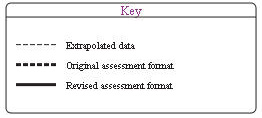Trend in NAEP mathematics average scores for 13-year-old students

Finding
- At age 13, the average score in mathematics in 2008 was 3 points1 higher than in 2004 and 15 points higher than in 1973.
* Significantly different (p < .05) from 2008.
1The score-point change is based on the difference of unrounded scores as opposed to the rounded scores shown in the figure.
NOTE: The lighter dashed lines for 1973 represent extrapolated data. View complete data with standard errors.
SOURCE: U.S. Department of Education, Institute of Education Sciences, National Center for Education Statistics, National Assessment of Educational Progress (NAEP), various years, 1973–2008 Long-Term Trend Mathematics Assessments.